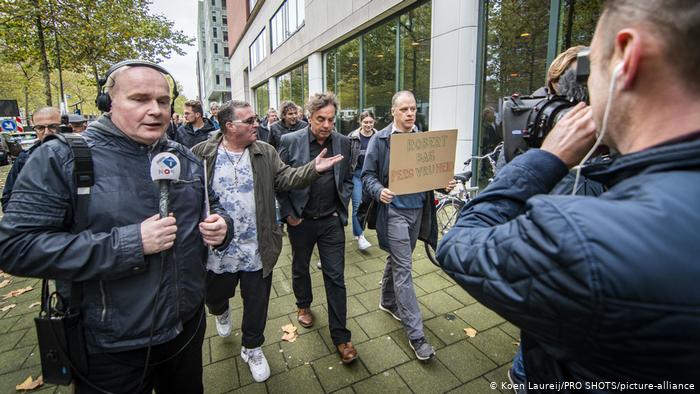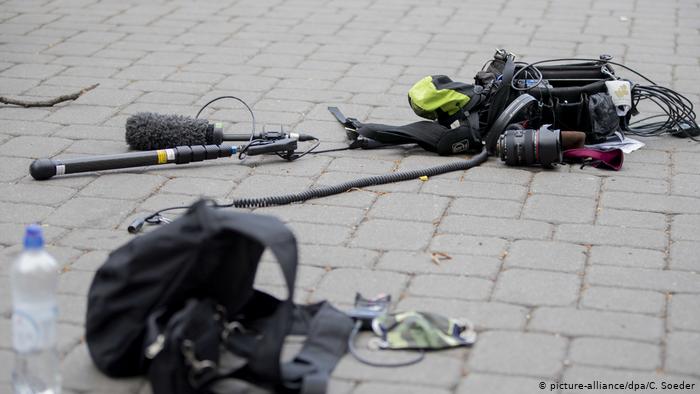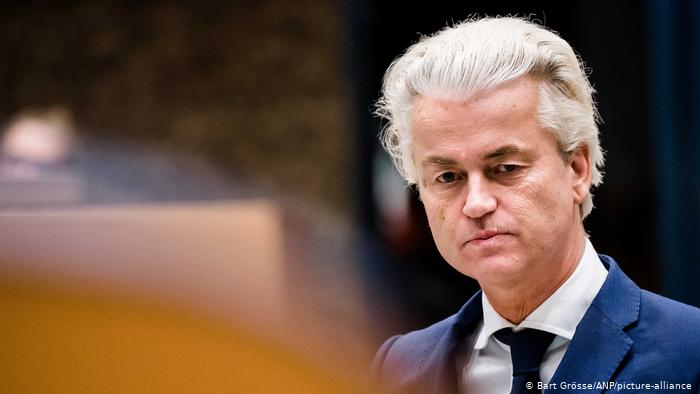
Audio By Carbonatix
The Dutch Broadcast Foundation (NOS) is removing company logos from its vehicles in response to an increasing number of attacks on its staff. It's a pattern repeating itself across Europe.
The Dutch Broadcast Foundation (NOS) has begun removing its corporate logo and slogans from company vehicles, as NOS Nieuws Editor-in-Chief Marcel Gelauff announced last week.
The organization, which is part of the Dutch public broadcasting system, is increasingly being targeted by members of the public.
NOS says its employees are regularly harassed while going about their work. The broadcaster says journalists are shown the finger and have rubbish thrown at them.
Sometimes, cars on the motorway will cut in before NOS vehicles. These are just some forms of abuse experienced by NOS staff. The organization has registered hundreds such incidents this year alone.
NOS journalists covering protests and other potentially dangerous events are routinely accompanied by bodyguards. Now, in light of the threat level, the organization is considering bodyguards for all NOS employees.
For months, the media organization mulled over whether removing company logos was the right thing to do for a public broadcaster. However, as the situation developed, it found it had no other choice.
Hostile climate
The move sparked consternation in the Netherlands and across Europe. Dutch Media Minister Arie Slob said he is deeply concerned about threats against journalists. Similarly, Germany's Journalists Association (DJV) said violence against journalists was "unacceptable."
Lutz Kinkel, who heads the European Centre for Press and Media Freedom (ECPMF), told DW he understands why NOS opted to remove company logos from their vehicles as "protecting employee safety has priority." But, he added, it is an "awful state of affairs that journalists are being vilified like this."

This, he said, was the case not only in the Netherlands but many other European countries as well. The EU-backed ECPMF recorded 34 attacks on journalists by members of the public between July and September this year alone — many of them at protests. Often, Kinkel says, online vitriol against journalists fuels real life abuse.
"This hostile climate is also a result of the digital transformation — opinions once deemed too extreme to voice are now getting a platform." Moreover, some social media users get caught up in their own echo chambers which are dominated by dubious media outlets. This can radicalize users and breed cynicism against traditional media organizations.
Attacks on German journalists
German journalists have also experienced considerable hostility of late. This summer, for instance, ZDF broadcast journalist Dunja Hayali stopped covering a Berlin protest march against coronavirus safety measures for security reasons.
And in May, 15 people attacked a ZDF camera crew shooting footage for the ZDF heute-show, a satire program. The incident also occurred near a rally against coronavirus measures. Five journalists were injured in the attack.
The ECPMF reports that in Germany, 119 violent attacks were carried out against journalists between early 2015 and March 2020. Many of them were instigated by figures affiliated with the political far-right. Indeed, the ECPMF says that "political events by the far-right pose the greatest danger to journalists."

Growing polarization
The hostile climate against media workers is stoked especially by the political right. "Right-wing populists politicians carry a lot of responsibility for journalists being targeted and singled out like this," says Lutz Kinkel. Right-wing figures commonly accuse public broadcasters of being government mouthpieces.
Indeed, the pejorative term Lügenpresse — German for lying press — has been popularized among the political right. It was voted the most inappropriate German word of the year 2014 after xenophobes at the so-called Patriotic Europeans Against the Islamization of the Occident rallies repeatedly used it to discredit the press.
NOS's Gelauff says that hateful rhetoric spouted by Dutch right-wing politicians like Geert Wilders and Thierry Baudet encourages members of the public to go after journalists. He says this is tragic, as politicians should in fact protect the press, which "forms a pillar of democracy."
In Eastern Europe, the situation is somewhat different, as ECPMF head Kinkel explains. "Because public broadcasters have become an integral part of the PR apparatus of right-wing governments in countries like Poland and Hungary, private media organizations are increasingly in the crosshairs."

Media literacy is key
It seems that journalists are facing growing hostility across the world, says Kinkel. "Our own statistics and records by Reporters Without Borders show that things are getting worse," he continues.
What, then, can be done to address this worrying situation? "While there is no justification for insults, threats and violence against journalists, media organizations are not entirely without blame," says Kinkel.
He says it has been known for years that many media organizations lack diversity, which is key in achieving more nuanced news coverage. Moreover, Kinkel says, few journalists are transparent about the processes behind their profession.
Kinkel says fostering media literacy can help counter the societal polarization we are witnessing today. "In my view, teaching media literacy should be mandatory, even to kids. When people do not know how to properly use media outlets and understand the value of fact-based discourse, we will no longer have productive public debate." This, he says, could undermine our very democracy.
Latest Stories
-
Kusaal Wikimedians take local language online in 14-day digital campaign
41 minutes -
Stop interfering in each other’s roles – Bole-Bamboi MP appeals to traditional rulers for peace
57 minutes -
Livestream: President Mahama addresses nation in New Year message
1 hour -
Industrial and Commercial Workers’ Union call for strong work ethics, economic participation in 2026 new year message
3 hours -
Crossover Joy: Churches in Ghana welcome 2026 with fire and faith
3 hours -
Traffic chaos on Accra–Kumasi Highway leaves hundreds stranded as diversions gridlock
3 hours -
Luv FM Family Party in the Park: Hundreds of families flock to Luv FM family party as more join the queue in excitement
4 hours -
Failure to resolve galamsey menace could send gov’t to opposition – Dr Asah-Asante warns
4 hours -
Leadership Lunch & Learn December edition empowers women leaders with practical insights
4 hours -
12 of the best TV shows to watch this January
4 hours -
All-inclusive Luv FM Family Party underway with colour, music, and laughter as families troop in to Rattray Park
5 hours -
Jospong Group CEO, wife support over 5,000 Ghanaians with food, cash on New Year’s Day
6 hours -
Life begins at 40: A reflection on experience and leadership
7 hours -
Maresca leaves Chelsea after turbulent end to 2025
7 hours -
NPP still hurting after 2024 loss – Justin Kodua
7 hours

